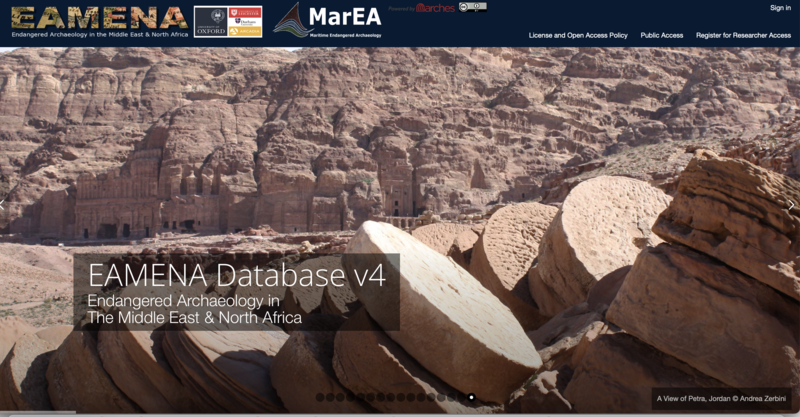Arcadia awards £2.2m for the continuation of the Endangered Archaeology in the Middle East and North Africa project (EAMENA)
The School of Archaeology, University of Oxford, in partnership with the Department of Archaeology, Durham University, and the School of Archaeology and Ancient History at the University of Leicester are very pleased to announce a new grant of £2.2m from Arcadia, a family charitable fund foundation - https://www.arcadiafund.org.uk. The three-year grant (2024–2027) will support the continuation of the EAMENA project. EAMENA also collaborates with the MarEA project in Southampton and Ulster Universities.

The EAMENA project records endangered heritage across the MENA region, by using satellite imagery and historic aerial photographs to identify and record archaeological sites across 20 countries from Mauretania to Afghanistan, documenting condition, damage and threats. So far, it has created more than 380,000 records, which are available on an open access basis https://database.eamena.org/
The new grant will support additional documentation work and development, including:
Documenting sites within landscapes which have seen major anthropogenic impacts, concentrating on recording sites at this scale, providing a framework for the documentation process;
Establishing a sustainable framework for the long-term future of the database, further developing the Arches database to improve and extend accessibility, and improving its capacity for large-scale resource management;
Continuing to develop Automated Change Detection tools to monitor landscapes and track changes affecting them;
Creating an online, open access Heritage Atlas using the large volume of historic maps, aerial and satellite photography we have collected, digitized and geo-corrected;
Bringing the project to completion and establishing an ordered archive of the work conducted on the project since 2015.
The novel scale of documentation achieved by the EAMENA project shows that the biggest threats are climate change and the scale and speed of development. The MENA region is highly sensitive to climate change which impacts not just individual sites, but entire landscapes, and so requires a change in the focus of documentation from sites to endangered cultural landscapes. Moving the focus and documenting these increasingly fragile landscapes supports the reconstructions of historic climate and future climate modelling.
The project has already had a significant impact in the region, as can be seen in the adoption of HERs based on the EAMENA database in a number of countries (Lebanon, Palestine, Jordan, the Kurdish Region of Iraq), and in the use of EAMENA ACD tools in North Africa. Implementation in the Kurdistan Region of Iraq (KRI) has led to the development of a follow-on project that has been funded by the ESRC Impact Accelerator Account at Durham University to support the integration of a mobile recording app, and the development of further national policy integrating the database in planning projects.
Over 200 professional archaeologists from the region have now been trained in EAMENA’s methods. The British Council’s investment (almost £4 million successfully levered from the Cultural Protection Fund (CPF) thanks to the Arcadia foundational grants) in EAMENA on cultural heritage protection throughout the region is another clear indicator of the success of the project, training many government antiquities staff in our methodology. EAMENA’s MOOC courses, developed at Durham, offer free open-access training materials on remote sensing for endangered archaeology. Furthermore, these courses have been translated into multiple languages of the region, including Arabic, Persian, and Kurdish, which was made possible by a Durham University Research Impact Fund Award. To date there are over 6000 active users of the MOOCs.
Arcadia’s decision to fund similar projects throughout much of the world is another measure of success. Being one of the largest Arches-user archaeology projects, EAMENA has actively participated in supporting the internationalisation of the platform, refining resource models, and contributing to sustainability plans for Arches users. The final phase of the project will ensure that the work conducted can be wrapped up tidily to ensure it has longevity. We are establishing a model that regional heritage authorities and research projects can follow for documenting and managing endangered heritage.
Our leading role in heritage protection in conflict has recently been recognised by the Palestinian Ministry of Tourism and Antiquities in their invitation for us to partner them and coordinate international responses to assessing the damage to cultural heritage and supporting subsequent reconstruction and conservation. Our work on protecting heritage from climate change is recognised in the partnership with ICOMOS-Jordan. We have also been consulted by various international organisations such as UNITAD, UNOSAT, EUAM, ALIPH and The Docket (Clooney Foundation for Justice) about our work documenting destruction to cultural heritage in conflict (e.g. Destroying the Soul of the Yazidis report).
The academic impact of the project is growing, with increasing numbers of research publications and presentations at conferences, such as Sacred Landscapes in Oxford (2023), the BANEA conferences in Oxford (2020) and Glasgow (2024), ICAANE in Copenhagen (2023), and ICHAJ in Jordan (2022).
Our Arches database is central to our documentation, providing a resource that is accessible and based in the FAIR (Findability, Accessibility, Interoperability, Reusability) principles. EAMENA aims to promote best practices in FAIR and serves as a reference platform for managing heritage and archaeological data, accommodating contributions from multiple projects across different chronological, spatial, and thematic dimensions in an open, cumulative, and transparent framework. The database is built around international standards and adheres to well-defined licensing frameworks, including data versioning, to facilitate publication of data papers and other outputs. https://eamena.org/open-access-policy
About EAMENA (http://eamena.org)
About Arcadia (http://www.arcadiafund.org.uk)




